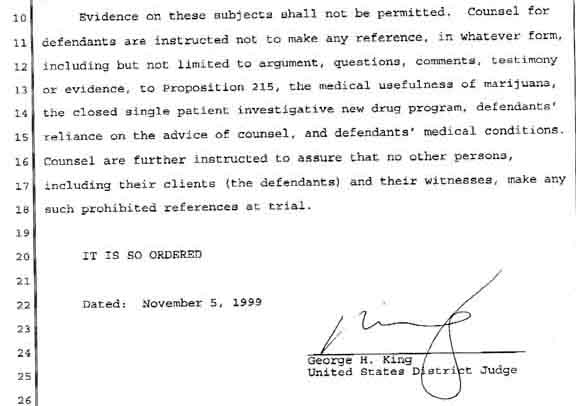In the most Kafkaesque turn of events to date, the trial judge has granted
the government's motion and ruled:

For complete ruling (4 pages), please click here.
(The investigative new drug program is the one in which the federal
government sends marijuana to 8 patients each month for medical purposes and has
been since 1972.)
This means my testimony will go something like this:
PROSECUTOR: "Mr. McWilliams, did you grow marijuana?"
ME: "Yes."
PROSECUTOR: "How much marijuana?"
ME: "About 300 plants."
PROSECUTOR: "Thank you."
End of testimony. The only question the jury will have to decide is whether
I am responsible for Todd McCormick's 4000 plants because I gave him a book
advance for How to Grow Medical Marijuana or the
1,600 plants Scott Hass allegedly grew with his severance package money from my
publishing company (he was the president of Prelude Press, Inc.).
The difference is the difference between a 5-year mandatory minimum (under
1,000 plants) or a 10-year mandatory minimum (over 1,000 plants).
At this point, due to my AIDS, I basically don't have an immune system, and
any stay in the germ-rich environment of a federal prison would be a death
sentence. I would no doubt be placed on the "hospital floor" where the
tuberculosis and other highly contagious patients are "quarantined"
from everybody except the prisoners on the hospital floor.
There is one possible alternatives to prison sentences:
Ask the judge after the guilty verdict to extend my bail during the
appeal process. (Usually in drug cases, the convicted are taken into custody
immediately after sentencing. Unlike rapists, kidnappers, and robbers, we pot
smokers pose a grave danger to the community.)
The Sixth Amendment to the United States Constitution reads:
In all criminal prosecutions, the accused shall enjoy the right to a
speedy and public trial, by an impartial jury of the state and district
wherein the crime shall have been committed, which district shall have been
previously ascertained by law, and to be informed of the nature and cause of
the accusation; to be confronted with the witnesses against him; to have
compulsory process for obtaining witnesses in his favor, and to have the
assistance of counsel for his defense.
It doesn't say a thing about the right to put on a defense.

